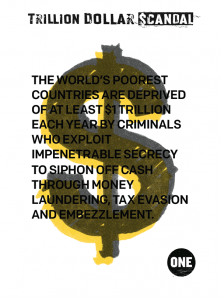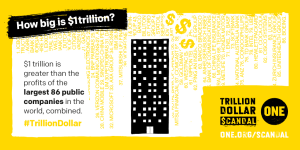The Trillion Dollar Scandal
 Extreme poverty has been halved in 20 years, and could be virtually wiped out by 2030. But progress is at risk because of the biggest heist the world has never heard of: The Trillion Dollar Scandal.
Extreme poverty has been halved in 20 years, and could be virtually wiped out by 2030. But progress is at risk because of the biggest heist the world has never heard of: The Trillion Dollar Scandal.
It is often difficult to put numbers on the disastrous effects of corruption, but analysis from the ONE Campaign’s new report shows the world’s poorest countries are deprived of at least $1 trillion each year by criminals and corrupt officials who exploit layers of secrecy to siphon off cash through money laundering, illegal tax evasion and embezzlement. That’s greater than the combined national incomes of Austria, Denmark and Finland combined.
If poor countries were able to crack down on this massive abuse of state funds, tax it at normal rates and spend it on basic health systems, it could raise enough money to save an average of 3.6 million lives a year. Countries like Liberia would have the proper resources to effectively contain an emergency like the current Ebola outbreak.
While the Lab advocates for empowering citizens in developing countries to fight corruption and build accountability themselves, it is also important to acknowledge that the policies of rich countries play a significant enabling role in the problem. Too often the stolen money is funneled through secret firms in developed countries and ends up in Caribbean islands or alpine havens- all linked to G20 countries. The World Bank has found that 70% of the 213 biggest corruption scandals of the last two decades involved anonymous shell companies in places like the British Virgin Islands or Delaware.
When developing countries’ governments received money for oil or gas, or even as foreign aid for development projects, citizens rarely have access to information on how much money their country received and where that money is being spent. Not only is the money that should be used to improve citizens’ quality of life channeled elsewhere, it also plays a corrosive role on the framework of society by undermining trust in the government, scaring off foreign investment and stifling job creation. At every stage, the poor pay the highest price.
The first step in setting up the systems of accountability to combat this theft of public funds is creating transparency. The ONE campaign has developed a four-point plan for world leaders to strengthen accountability for their role in the Trillion Dollar Scandal and to empower citizens to follow the money in their country:
- End secret companies so criminals can no longer hide their identities.
- Force oil, gas and mining firms to ‘Publish what you pay’ to governments.
- Crack down on tax evaders by giving tax collectors information on secret bank accounts held offshore.
- Open up government data so people can follow the money from resources to results.
As G20 leaders meet in November, they have a great opportunity to make simple, low-cost actions to meet the goals above. Together with ONE and several others, we are calling on them to be accountable for their role in the problem to make these changes now.
Download the full report here.

